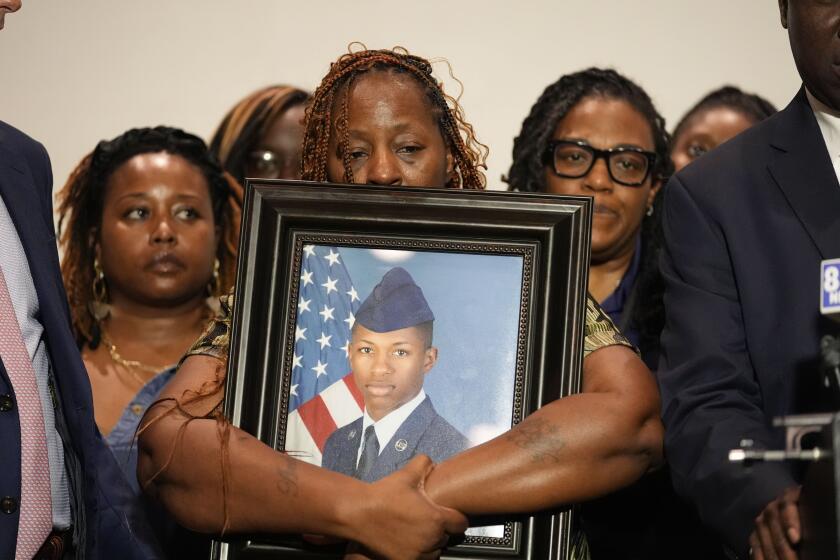No Joy in Silver for Guevara
Even before Ana Guevara took her place in Lane 3 of Tuesday night’s 400-meter race -- one running shoe trimmed in red, the other green -- the Olympic stadium erupted in cheers of “Ana! Ana!”
In a land where sports heroes are always male and usually soccer players, the 27-year-old Mexican runner is a rare icon and, as she herself acknowledges, a role model for women and girls throughout Latin America.
Having resisted her father’s admonitions that track and field was not an appropriate sport for a girl, and having failed to be a star at basketball (she’s only 5 feet 8), Guevara became one of the fastest women on the planet.
Her picture graces billboards in Mexico, tracks are named in her honor, shoe and sunglass designers launch products for her. Copper miners near her native Nogales have bronzed a pair of track shoes in her honor.
And so on Tuesday, Mexico came to a halt to watch Mexico’s most celebrated athlete go for the gold.
The Televisa network estimated that 15 million viewers tuned in to see Guevara’s event.
President Vicente Fox rushed home from a trip to catch the race, viewing it ultimately in the airport hangar.
And at the Olympic Stadium here, huge crowds waving Mexico’s red-and-green flags seemed to outnumber other national delegations as they cheered Guevara on. She had to shush them quiet at the start of the race, placing her fingers to her lips as she lined up on her mark.
Guevara, ranked No. 1 in the 400 meters after the world championships last year in Paris, burst off her mark in her characteristic head-down, shoulders-hunched pose.
Just under 50 seconds later, she had brought Mexico its first medal in these Summer Games.
Yet, somehow, even as she donned a red sombrero and did a victory lap, her result wasn’t good enough. It was only silver, not gold, and she had let her nation of admirers down.
Guevara’s 49.56 seconds was her best time this year but was 0.15 of a second behind Tonique Williams-Darling of the Bahamas, who took the gold and who last month ended Guevara’s three-year undefeated streak.
The tone of disappointment was palpable in Mexico City and in Nogales, where her father was watching the race, with Mexican TV cameras watching him watch.
As the race ended, Televisa showed Cesar Guevara looking blankly at the screen.
In Mexico City, at the tall, gilded monument to the Angel of Independence in the center of the capital where Mexicans normally come together in moments of national triumph, a planned victory celebration never materialized.
The dozens of police officers who had mobilized to control it far outnumbered the few fans who showed up. The fans stood glumly around the edge of the monument.
One of them, Elsa Bolanos, 45, held a hand-lettered “Gracias, Ana” sign, hoping people would come anyway. Eventually, she gave up and returned to her job as a receptionist at a nearby medical clinic.
“We shouldn’t have demanded so much of Ana,” Bolanos said. “The entire weight of the country was on her.”
In Athens, Guevara had to defend herself instead of relish in what was, after all, a victory.
The matter of a recent injury figured heavily. Guevara developed tendinitis in her left Achilles’ tendon over the winter, which forced her to miss two months of training and meant much of her running this year was in a swimming pool, something she said Tuesday she hated.
“I have dreamed all my life to be here,” Guevara, the eldest of five children, told a post-race news conference. “Things happen. Sometimes you’re up, sometimes you’re down. I did the best I could.”
A legion of Mexican reporters rose to first congratulate Guevara and then ask how she would handle the disillusionment.
Then, at the end of the news conference, someone handed Guevara a cellphone and she took a call from Fox, the president.
“We are as happy as if you had won the gold,” he said.
“Thanks a lot,” she said. “I have given the best of myself, made my best effort in the last few months to achieve this [medal]. I came to the Olympic Games with my head held high and proudly represented my country. I feel very proud to have this medal and to continue being a driving force ... for my country.”
*
Wilkinson reported from Athens, Boudreaux from Mexico City.
More to Read
Start your day right
Sign up for Essential California for news, features and recommendations from the L.A. Times and beyond in your inbox six days a week.
You may occasionally receive promotional content from the Los Angeles Times.







